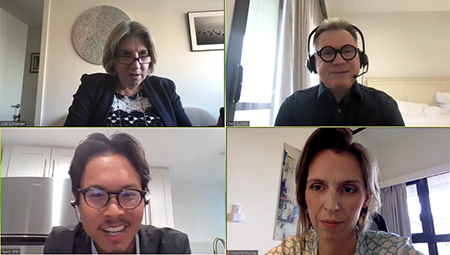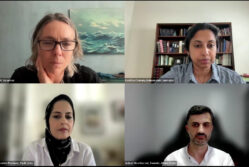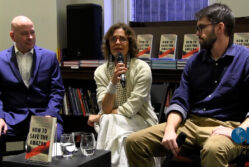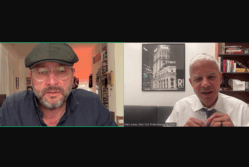Event Coverage Highlight

China Correspondents Who Left Under Pressure Warn about Waning Expertise
In the early days of the pandemic last year, amid growing restrictions against journalists and brinkmanship between Beijing and the White House, many foreign journalists were effectively expelled or pressured to leave. Now, with veteran China Hands still trying to cover the country from outside, growing pressure on the ones who remain, and conditions becoming harder for new correspondents to begin careers in China, the outlook for accurate, nuanced journalism about the growing superpower is bleak.
On June 15, the OPC hosted a discussion with three journalists who were forced or pressured to leave China: Chris Buckley, the senior New York Times China correspondent; Yvonne Murray, a reporter for Irish public service broadcaster RTÉ; and Gerry Shih of The Washington Post. The moderator was Jodi Schneider, a senior editor at Bloomberg News in New York who recently returned from a five-year stint in Hong Kong, where she served as president of the Foreign Correspondents’ Club Hong Kong.
She asked Shih about his experience as one of 12 journalists expelled from China in a single day in March last year. He said the move was posted late at night on the Foreign Ministry’s website. Shih said despite warning signs, the announcement came as a surprise. Three Wall Street Journal journalists had been expelled two weeks before, and journalists had been closely watching the tit-for-tat trade and diplomatic maneuvers between Beijing and the Trump administration slowly escalate in early 2020.
“It really in some ways came as a complete shock because you work under pressure in China for so many years and you’re used to surveillance and harassment at various levels. It still comes as a surprise when this really happens.”
The announcement sent journalists scrambling to make arrangements, even jockeying to schedule movers as they prepared to leave their homes. “I’ll just say that business was pretty good for moving companies that month.”
Murray left China in March 2021 amid concerns for the safety of her husband, John Sudworth, China correspondent for BBC News. They had been harassed through the visa process and other means for some time.
“This began to take a quite sinister turn with these threats of legal action. [Chinese] officials began to say things like ‘someone might sue you.’ And of course, when you hear that kind of thing, this is designed as a veiled threat, it seems. These things are not said lightly.”
Overt threats of legal action were then repeated in official statements and in state media.
Those statements came at a time when state-sponsored media was attacking Sudworth’s reporting, including on alleged forced labor of Uyghur Muslims in Xinjiang’s cotton industry.
Having lived in China for ten years, they moved to Taiwan with their three children, two of which were born in China.
“While we could probably stick it out – we’re doing our jobs and it comes with the territory – we felt that it just wasn’t fair to continue exposing the children. It didn’t feel like a particularly comfortable or safe place to be raising a family,” she said.
Buckley covered the early stages of the pandemic from Wuhan. His status had already been uncertain as the Chinese government was granting him only short-term visas. While he was working in Wuhan, he learned that his final visa would not be renewed, and after a quarantine in Beijing moved to Sydney, Australia after about 24 years working in China in April last year.
Buckley said with expulsions of foreign reporters and general tightening for journalists who remain in China, it has become much more difficult to do “textured, on-the-ground stories about people’s lives,” and to provide depth and investigation in the reporting.
“Not having reporters on the ground makes it more difficult to address rumors or conspiracy theories or simply misleading cliches about China when you’re not on the ground and can’t point to something and say ‘no, this is the reality.’”
Murray said correspondents outside the country are doing their best to boost reporting with data journalism and other tools, adding that “it would be wrong to give the impression that China reporting is over. It’s far from over, and there are many people inside the country doing incredible reporting despite the pressures that they’re under.”
She said a dangerous trend is that some news organizations try to cover China from outside, never having set foot in the country.
“You have a lot of newspapers, especially in Europe, who have been trying to cover the coronavirus from a distance, and I think you can tell when people don’t have that level of expertise.”
Murray said the story of China’s increasing global reach has “snuck up” on many newsrooms, because of a lack of investment in developing China expertise. She added that news organizations should do more to improve staff diversity, fund postings, and encourage people with language skills to cover China.
Shih said he finds it much harder to get candid information from sources while working outside the country.
“Purely speaking in the circles of policy reporting or government-related or political reporting, despite the extreme sensitivity and a reluctance to chat over social media, there were still plenty of think-tankers or government advisors or professors who were happy to talk to you if it was within the closed confines of their office.”
Buckley added that while many younger journalists aspire to work in China, opportunities are not as open as they used to be.
“It’s important for us to think about how we can nurture that next generation of Chinese journalists working in China, and what can be done to provide opportunities so that they have opportunities to build up that expertise and on-the-ground experience which is so important.”
Click the window below to watch a playlist of video clips from the program.




